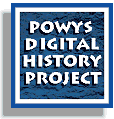
Religion in Wales
The beginnings of dissent
Questioning the role of the church
While on the one hand older catholic traditions were proving
hard to eradicate among the ordinary population, on the other
there was a growing questioning of the role of the church itself.
Men like John Penry of Llangamarch
were more open to Protestant teachings, and unhappy with the
state of pastoral care in the church.
There were too many priests who were enjoying the incomes of
the glebe lands and who were absent or inactive among their parishioners,
and far too many ill-educated curates and clergy on very low
stipends.
Penry’s publications calling for reform among the clergy
were seen as a challenge to the authority of the church, for
which he eventually paid the ultimate penalty of execution.
The influence of Puritanism
Puritanism, although recorded in Wales in Cardiff and Wrexham,
had only a small presence in Wales at this time,and Penry should
be seen as important in retrospect rather than influential in
his own day. In the early 17th century a small number of Welshmen
were coming under the influences of English Puritanism and building
up a small following. Some, like Rhys Pritchard, vicar of Llandovery
from 1604 to 1644, tried to steer the established church towards
Puritanism, encouraging the reading of the bible in Welsh and
preaching to large crowds in the open air. In some parishes endowments
were used to create lectureships giving puritan preachers a voice
from the pulpit.
Some puritans left the established church entirely and attempted
to set up separatist congregations. William Erbury and William
Wroth, both former vicars of the church, attempted this at Llanfaches,
and a Baptist church appeared at Olchon in the borderlands around
1633, where separatists from Herefordshire, Radnorshire and Breconshire
could hope to worship away from public attention.
There are 4 main pages in this sequence. Use the box links below to view the other pages.